It doesn’t matter whether you’ve lived with cats your entire life or for only a week. You must already know the kinds of foods that cats should eat.
Though house cats have been domesticated for thousands of years, they still share many traits with their wild cousins. One of those is their dietary habits.
Like their wild feline cousins, domestic cats are primarily obligate carnivores. Therefore, they thrive almost exclusively on a diet of animal protein. But does that make all plant-based foods toxic to cats?
Not necessarily. You must have caught your cat nibbling on grass in your garden or backyard at some point.
Like most other carnivores, cats can safely consume certain plant-based products once in a while. Now, tea is one of the most common drinks in many homes around the world, whose popularity is only rivalled by that of coffee.
By virtue of its availability, it’s not unusual to find some cat owners toying with the idea of sharing tea with their feline friends. But can cats drink tea?
Unfortunately, cats cannot drink tea. Tea contains many compounds that are considered harmful to cats. Examples include tannins, catechins, caffeine, and theanine, not to mention artificial additives like taste- and flavor-enhancers.
So, is tea toxic to cats?
Yes, tea is packed with numerous compounds that, though are totally harmless to humans, are highly toxic to cats.
This post shall take an in-depth look into the topic of tea and cats by sharing insights on what might happen if your feline friend helps itself to tea behind your back.
Table of Contents
More About Tea
Is it okay for cats to drink tea?
No, it’s not okay to offer tea to your cat. But before we examine what could possibly go wrong if your kitto gets exposed to tea, let’s begin easy by understanding exactly what tea is.
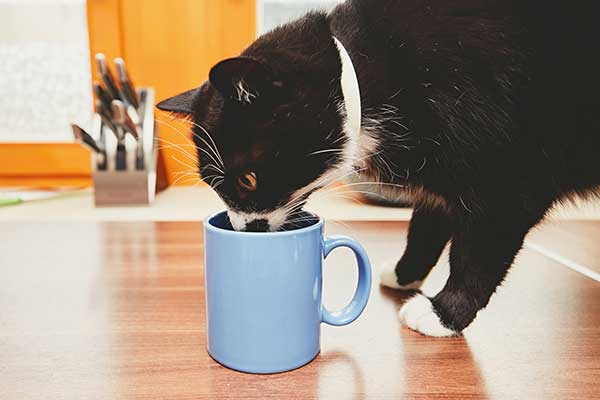
Tea goes by the scientific name Camellia sinensis. The plant is cultivated in various regions around the world and mostly thrives in cool and wet conditions. The most common compounds in tea include catechins, theanine, tannins, and caffeine.
Now, tea (the drink) is an aromatic beverage that’s made by crushing the dried leaves of the tea plant and adding the leaves to boiling water.
The longer you allow the tea leaves or tea bags to sit in hot water, the stronger the drink becomes.
Most people generally associate caffeine with coffee. But did you know that the tea plant actually contains more caffeine than coffee beans?
The only reason you’re likely to be exposed to more caffeine in coffee is the difference in preparation methods. Coffee follows a more rigorous brewing process which ensures that much of the caffeine remains intact.
That said, the amounts of caffeine that are present in tea are still considered dangerous for cats. In addition to tea and coffee, other plants that contain caffeine include Yerba mate, Guarana, and Yaupon holly.
It’s also worth noting that a cup of tea contains more than just the three chemicals present in tea plants. After preparation, tea might also contain sugar and other sweeteners, milk and cream, among other ingredients. As you shall find, most of these ingredients are reasonably toxic to cats.
- PETKIT Automatic Cat Dog Feeder Dispenser for dog cat Pets
Last update on 2025-02-28 / Affiliate links / Images from Amazon Product Advertising API
Do Cats Like Tea?
It’s not unusual to come across cat owners wondering, why does my cat drink my tea?
It’s undeniably true that cats are naturally attracted to tea. That’s all thanks to the drink’s strong and pleasant aroma.
Remember that cats have a profound sense of smell that’s far more developed than that of humans. So, it doesn’t matter whether tea is in plain sight or tucked away in high kitchen cabinets, your feline friend will always be drawn to the drink.
Another thing that makes tea attractive to cats is the creamy appearance, especially if the drink is prepared using milk. Despite most adult cats being lactose intolerant, they have this unrequited love affair for milk.
The combination of a pleasant aroma and a creamy appearance makes tea very appealing to cats.
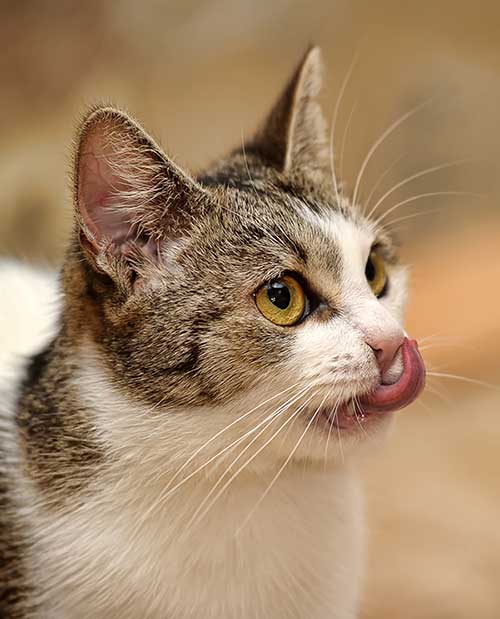
But is tea good for cats and if yes, can cats have tea?
Now, the fact that tea is alluring to cats doesn’t make the drink safe for them. So, as a cat owner, you may need to go out of your way to keep tea out of reach by your feline friend.
What Are The Adverse Effects of Tea For Cats?
First off, the medical side effects of tea for cats depends on the number and strength of toxic chemicals in the drink, as well as the amount of tea that your cat has consumed.
Although one or two drops might not result in any adverse effects, gulping down a cupful of tea will likely have you schedule a visit to the vet.
Also, while many of the natural chemicals in tea are toxic to cats, it’s caffeine that should worry you the most. Exposure to high levels of caffeine causes caffeine toxicity in cats.
Symptoms include;
- Restlessness or hyperactivity, as is evidenced by pacing, excessive licking, and bouncing off objects,
- Anxiety symptoms, such as jitteriness and panic,
- Confusion and disorientation,
- Panting,
- High blood pressure,
- Elevated and/or irregular heartbeat,
- Neurological symptoms like body tremors, seizures, and collapse,
- Gastrointestinal symptoms like nausea, vomiting, diarrhea, and abdominal discomfort,
- Drooling, and
- Dehydration, as is evidenced by dry eyes, dry nose, infrequent urination, and constipation

Evidently, caffeine poisoning is a serious medical condition that requires urgent treatment. But what of decaffeinated tea, can cats drink decaffeinated tea?
One common concern among cat owners who are adamant about offering tea to their kittos is, can cats drink decaf tea?
The mere fact that tea is free from caffeine doesn’t necessarily make it safe for cats. That’s because the drink might still contain ingredients that cats shouldn’t eat.
- EASY TO USE, IMPACTFUL RESULTS: Collect a sample, package it up, and send it securely back. Just register, swab, return with the...
- MOST COMPREHENSIVE BREED & TRAIT: Our test distinguishes over 20+ distinct breeds and 50+ trait markers with the most...
- SCREEN FOR 40+ GENETIC DISEASES: Get peace of mind by screening for 64 health markers associated with 43 diseases for which your...
Last update on 2025-02-28 / Affiliate links / Images from Amazon Product Advertising API
Additional Risks of Tea for Cats
In addition to caffeine, tea comes with plenty of other potential risks for cats.
The following are common tea ingredients, along with their respective health effects for cats;
1. Milk
Can cats drink tea with milk?
Now, the most obvious reason why cats should not consume milk is that they’re lactose intolerant. Their bodies do not have the enzyme lactase that’s required to process milk.
Kittens are an exception to this rule, as their bodies can still manufacture the enzyme lactase. The ability of a cat’s body to produce this enzyme reduces as the animal grows older.
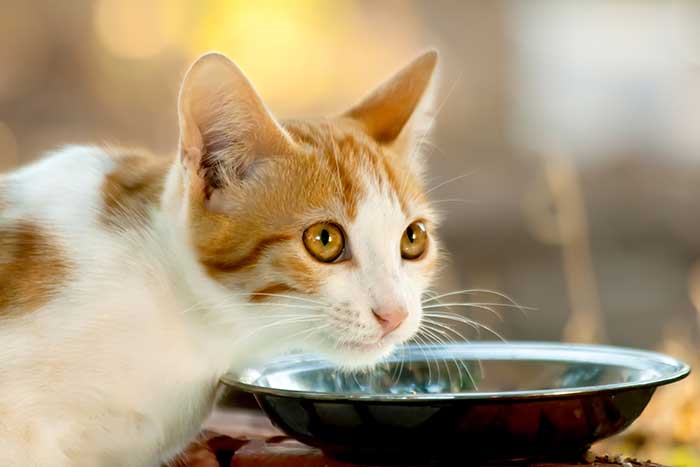
So, can kittens drink tea?
Unfortunately not. Kittens may be more tolerant to lactose compared to adult cats, but they can still suffer the health risks associated with the other toxic tea ingredients like caffeine.
In fact, anything that can go wrong if a cat drinks tea will almost certainly go wrong if the cat in question is a kitten. That’s because the digestive system of kittens is highly sensitive to foreign foods, particularly plant-based products like tea.
Another major concern with milk lies in the amount of cream used to prepare the tea. Cream is loaded with high amounts of fat that could cause your cat to develop obesity and other weight-related conditions.
The high fat content in cream might also lead to other debilitating conditions like diabetes, as well as heart and cardiovascular diseases. Plus, fat might irritate your cat’s stomach.
2. Sugar
Sugar is the most popular tea additive and is primarily used as a sweetener. But can cats drink sweet tea?
While sugar is perfectly fine for humans, just a small amount of it is potentially toxic to cats.
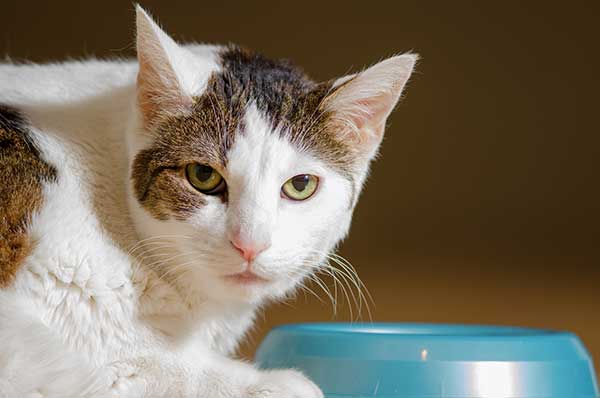
Sugar interferes with your cat’s blood pressure, making the animal more susceptible to heart and cardiovascular diseases. Sugar also plays a central role in increasing the risks of weight-related diseases like obesity and diabetes. Not to mention, its ability to encourage dental caries and periodontal diseases.
In addition to sugar, many other flavor enhancers used to sweeten tea, including chocolate, xylitol, vanilla, etc., are also considered toxic for cats.
What of unsweetened tea, can cats drink unsweetened tea?
Again, the apparent lack of sweeteners in tea doesn’t necessarily make the drink safe for cats.
- Ultra-quiet & low consumption pump – The Veken pump is ultra-quiet (measured below 40dB) and low consumption which means that it...
- 2.5L large capacity – It has a water capacity of 2.5 liters (84 ounces), which means that it is great for small to medium sized...
- BPA free & quality material – Made of quality PP resin, this automatic water bowl is BPA free, durable, and it’s easy to...
Last update on 2025-02-27 / Affiliate links / Images from Amazon Product Advertising API
3. Essential Oils
Some teas are often flavored with essential oils, the very oils that cats should not consume. A cat’s body isn’t designed to process essential oils, which makes these oils just as toxic for cats as many other tea ingredients are.
Can cats drink earl grey tea?
The fact that earl grey is an essential oil makes earl grey tea unsafe for cats.
Can cats drink lavender tea?
Lavender is another essential oil that cats should not come into contact with.
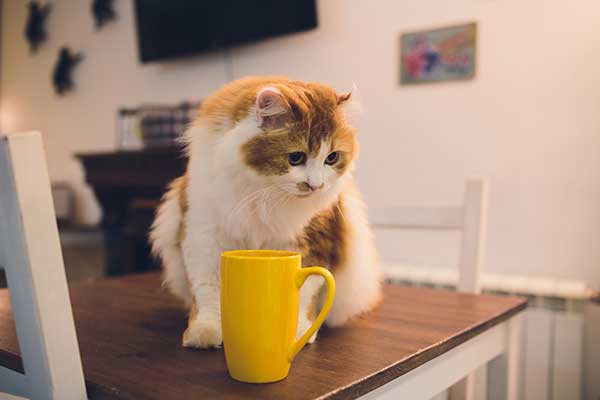
Does The Type Of Tea Matter?
As you may already know, tea comes in various shapes and forms, including black tea, green tea, Matcha, fermented tea, yellow tea etc.
But can cats drink black tea? And what of green tea, can cats have green tea or is green tea bad for cats?
Both black and green tea pack numerous antioxidants. However, is green tea good for cats?
The keyword here is “true tea.” Any tea that’s prepared from the leaves of the Camellia sinensis plant is considered as true tea and as such, is bad for cats.
Can cats drink ice tea?
Again, this ties back to the presence of caffeine. If the ice tea contains caffeine and those other harmful ingredients, then it isn’t safe for cats.
Can cats drink chai tea?
Being a true tea, chai tea is harmful for cats as it contains caffeine, tannins, bromine, etc. However, what makes chai tea even more deadly is the additional spices that are often used to prepare the tea.
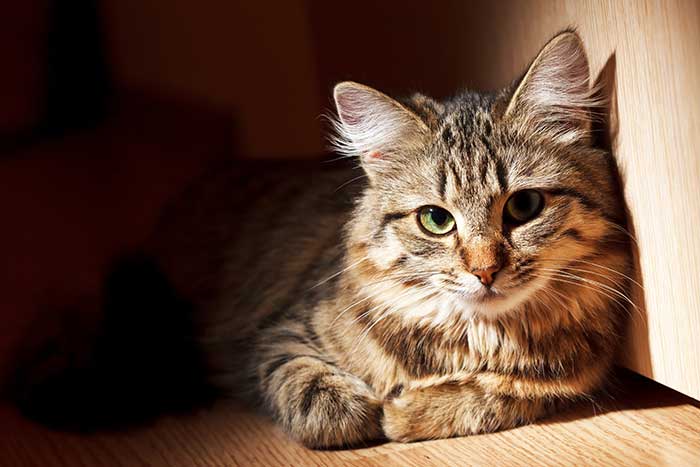
Can Cats Drink Herbal Tea?
Herbal teas are contrasted from true teas by the fact that they are not necessarily prepared from the leaves of the Camellia sinensis.
However, not anything that’s labelled “herbal” is actually safe for cats. As we’ve just seen, essential oils like earl grey and lavender are toxic to cats, despite being herbal extracts.
Let’s briefly examine the toxicity status of various herbal teas for cats;
Can cats drink chamomile tea?
While chamomile comprises various species, most variants of the plant are safe for cats. Some of the health benefits of chamomile tea for cats include relief from stress and insomnia.
Can cats drink valerian tea?
Like chamomile, valerian is popular for its positive effects on anxiety and insomnia. It’s also a mild stimulant and can boost your cat’s energy levels. All those effects make valerian tea fine for cats.
Can cats drink mint tea?
Mint is an umbrella that comprises different plant variants. Some mint species, such as peppermint and spearmint, are okay for cats in small amounts.
- AUTOMATICALLY REMOVES WASTE: No scooping, cleaning or refilling your cat's litter box for weeks
- UNBEATABLE ODOR CONTROL: Crystal litter removes smell by absorbing urine and dehydrating solid waste
- NO MORE MESSY FLOORS: Low-tracking crystals are 99% dust free and don’t stick to your cat’s paws
Last update on 2025-02-27 / Affiliate links / Images from Amazon Product Advertising API
Can cats drink peppermint tea?
Yes, a small amount of peppermint tea can soothe your feline’s stomach.
Can cats drink ginger tea?
Ginger contains anti-anxiety properties that make ginger tea beneficial to cats.
Can cats drink catnip tea?
Also known as catmint, catnip is one of the most popular cat-friendly plants, thanks to its incredible ability to calm down a nervous cat. Therefore, cats can definitely drink catnip tea.
Can cats drink hibiscus tea?
Yes, hibiscus is another cat-friendly plant, which makes hibiscus tea safe for your kitto.
Can cats drink dandelion tea?
Dandelion contains powerful antioxidant and anti-anxiety compounds that your cat can benefit from.
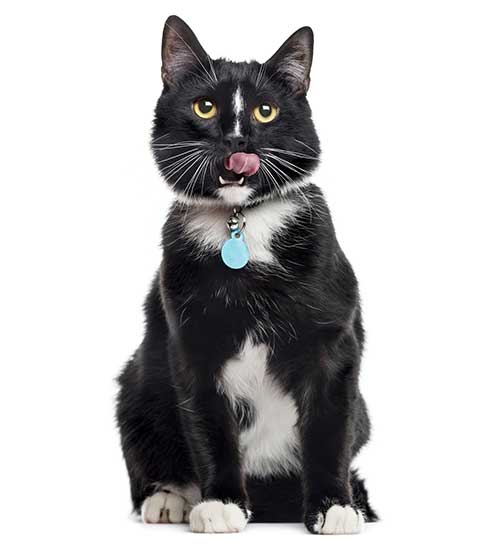
Can cats drink nettle tea?
Stinging nettle is commonly used as a cat repellent, which makes nettle tea unsafe for cats.
Can cats drink jasmine tea?
Unfortunately, Jasmine is known to cause skin allergy in pets, so jasmine tea cannot be good for cats.
Can cats drink fennel tea?
Fennel tea is encouraged for cats as it comes with a host of health benefits, including freshening their breath.
Can cats drink Arizona tea?
Though not technically a herbal tea, Arizona tea is a tea that’s prepared by the Arizona Beverages company. What makes Arizona tea harmful for cats is the additives and flavor-enhancers used in preparing the tea.
So, can my cat have herbal teas? As is now abundantly clear, herbal teas are only beneficial to cats if the herbs used are considered safe for them.
Conclusion
Now, whichever way you look at it, tea remains toxic to cats. Instead of giving your feline friend this harmful drink, consider supplementing its diet with a better substitute for tea, such as broth or goat milk.
Also, always ensure that your cat is well hydrated to avoid the temptation of drinking any liquid that it comes into contact with.

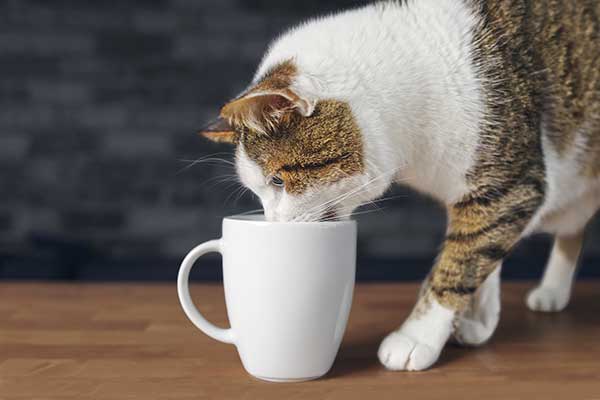





Love this article, Thanks for posting. God Bless Wonderful Cats!!!